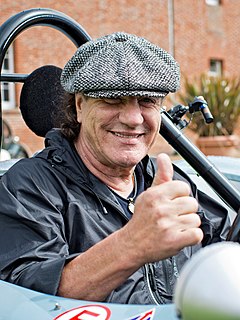A Quote by James Patterson
This is my brain: O This is my brain after making out with Fang: * It's very sad.
Related Quotes
Everyone uses the brain at every moment, but we use it unconsciously. We let it run in the background without realizing the power we have to reshape the brain. When you begin to exercise your power, the everyday brain, which we call the baseline brain, starts to move in the direction of super brain.
Since functional brain imaging first emerged, we have learned that there aren't very many brain regions uniquely responsible for specific tasks; most complex tasks engage many if not all of the brain's major networks. So it is fairly hard to make general psychological inferences just from brain data.
A long iron rod rocketed straight through the very forefront of Phineas Gage's brain. It's kind of an unusual part of the brain: you can suffer pretty severe injuries to it and often walk away from the injury. It's not a part of the brain that's necessarily vital for your biological self. But it is very important for personality.
Because we do not understand the brain very well we are constantly tempted to use the latest technology as a model for trying to understand it. In my childhood we were always assured that the brain was a telephone switchboard...Sherrington, the great British neuroscientist, thought the brain worked like a telegraph system. Freud often compared the brain to hydraulic and electromagnetic systems. Leibniz compared it to a mill...At present, obviously, the metaphor is the digital computer.
Autism is a neurological disorder. It's not caused by bad parenting. It's caused by, you know, abnormal development in the brain. The emotional circuits in the brain are abnormal. And there also are differences in the white matter, which is the brain's computer cables that hook up the different brain departments.
We live in the Age of the Higher Brain, the cerebral cortex that has grown enormously over the last few millennia, overshadowing the ancient, instinctive lower brain. The cortex is often called the new brain, yet the old brain held sway in humans for millions of years, as it does today in most living things. The old brain can't conjure up ideas or read. But it does possess the power to feel and, above all, to be. It was the old brain that caused our forebears to sense the closeness of a mysterious presence everywhere in Nature.


































